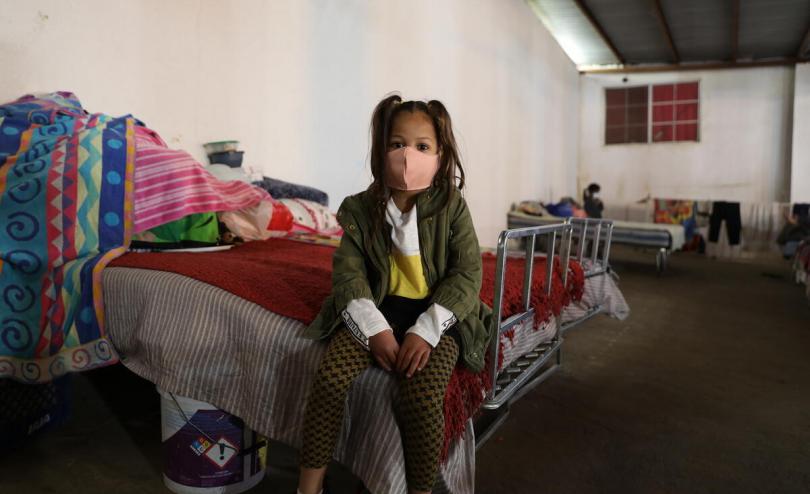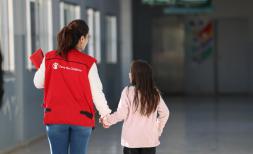Mexico: Rising number of migrant children pushing shelters to capacity

Thousands of children making the dangerous journey to the United States are being held in Mexican shelters that are rapidly filling up, with some lacking basic necessities, Save the Children warned.
The rising number of migrants and asylum seekers from El Salvador, Guatemala and Honduras hoping to cross the border with the U.S. included an increase of unaccompanied children. U.S. government figures show that in March alone, 18,890 children were identified entering the US.
The numbers of unaccompanied children rose sharply over the past months. From January to March of this year, 34,173 unaccompanied children were identified at the border between Mexico and the United States; an increase from 14,414 identified from October to December of last year. Some of these children were previously in Mexico with their families or with other people who wanted to cross the Mexico-U.S. border. But now, because of policy changes not to expel unaccompanied children, they’re being sent to the U.S unaccompanied, causing family separation and significant risks during border crossings, said Save the Children.
“In addition to the significant flow of unaccompanied children who are arriving in the United States, our field staff have witnessed the number of migrants and asylum seekers is still growing along the US-Mexico border, including the number of unaccompanied children. The journey is becoming more dangerous as they are arriving in Mexico through unsafe routes to avoid immigration controls”, said Jorge Vidal Arnaud, Director of Save the Children's Programs in Mexico.
“The situation is becoming critical: the shelters set up by the government or civil society in different parts of the country are filling up and risk becoming overcrowded. Some lack food or clean water, and some don’t have measures to prevent the spread of COVID-19. In those shelters, 15% of the population has been detected with possible COVID-19 symptoms. Overcrowded spaces are also a danger for children, as it puts them at risk of violence, including sexual abuse and exploitation”, Vidal said.
Children are making the long and dangerous journey to flee from poverty, forced recruitment, violence and abuse. Others are trying to reunite with family in the U.S. or seek a new beginning, after the devastation caused by hurricanes Iota and Eta late last year and continued impacts by climate change and the dry corridor.
“My dream is to become a teacher. My family and I fled from our home because we lost everything due to the hurricane. I miss my life in Honduras, but I’m happy that I can learn and play because of Save the Children”, said 10-year-old Susana*.
“I’m from Honduras. My partner abused me a lot”, 35-year-old Marta* told Save the Children. “He beat me. The last time he almost killed me and my three children. That's why I made the decision to leave. We entered the United States, but they arrested us. My baby got sick and they took us to the hospital, but they separated me from my other two children for four days. Then the authorities returned me to Mexico and I have been here for 15 months, hoping to cross soon,” she said.
Save the Children believes the number of children and unaccompanied children could again increase. The organisation is calling for all countries in the region to promote policies that protect children rights, increase humanitarian support and address children's needs in all the migrant routes.
“Hundreds of thousands of families have fled violence and instability in Central America’s Northern Triangle, comprising Guatemala, Honduras, and El Salvador. Children and their families are experiencing severe humanitarian needs while migrating and the COVID-19 pandemic exacerbates their vulnerability. We ask the Governments to ensure their rights are fulfilled no matter their migratory status”, said Victoria Ward, Regional Director for Save the Children in Latin America and the Caribbean.
Recently, Mexico passed legislation to give greater protection to migrant children, including: family non-separation; non-detention by immigration authorities; and the obligation to provide adequate protection and accommodation while their situation is resolved. Save the Children calls on the Mexican government to enforce these measures and protect the well-being of migrant children, many of whom have been stuck in shelters for two years, waiting for a resolution of their immigration process in the U.S.
For more information or interview requests, kindly reach out to:
Faiz Jamil, faiz.jamil@savethechildren.org /
Monica Kuljich, monica.kuljich@savethechildren.org
Out-of-hours (GMT) and weekend: Media@savethechildren.org.uk / +44 7831 650 409




